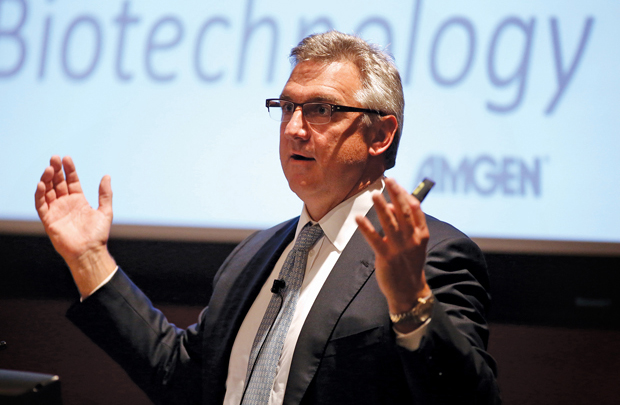As chairman and chief executive officer of Amgen, Robert A. Bradway is keenly aware of how tough and how expensive it is to bring new drugs to market.
He also knows pharmaceutical companies must strike a delicate balance between pleasing shareholders and creating next-generation pharmaceuticals. At a time when research and development are becoming more expensive and research funding is declining, it’s a difficult task.
And yet, he is kind of an optimist when it comes to the future of the biotechnology. Why? He credits the success of the human genome project with ushering in a new era in biotechnology, one that has made it possible for scientists to home in on human genetic variants quickly and relatively inexpensively.
“The challenges for all of us are profound,” said Bradway, who was the first speaker of the 2014-2015 Dean’s Distinguished Lecturer series. “But I believe there are going to be some major breakthroughs.”
To facilitate such breakthroughs, Amgen acquired an Icelandic company that specializes in identifying genetic risk factors for human disease. Before a packed house in Aresty Auditorium on Aug. 13, Bradway said that the company’s focus on identifying rare variants is helping it develop potential treatments for several serious diseases.
Amgen is developing a new class of drug, a so-called PCSK9 inhibitor, to lower unhealthy LDL cholesterol. Scientists at Amgen are also studying a novel target, TREM2, that is linked to Alzheimer’s disease.
It is in the area of cancer treatment, however, that Bradway said the company is “on the verge of exciting breakthroughs.” The company earned a breakthrough therapy designation from the U.S. Food and Drug Administration for a type of immunotherapy for acute lymphoblastic leukemia. Amgen is also testing an oncolytic virus for the treatment of metastatic melanoma.
Bradway said he doesn’t expect the challenges to become easier, and he hopes that both the biotechnology industry and scientists in academia will come together and face them head on.
— By Hope Hamashige


